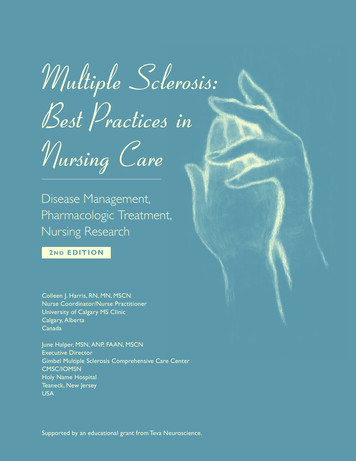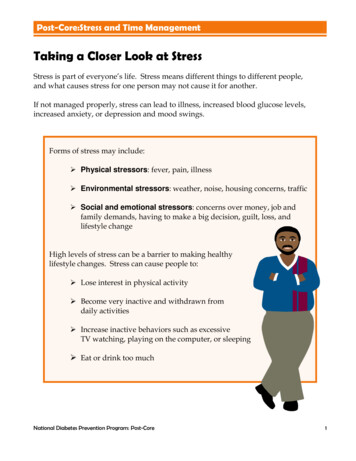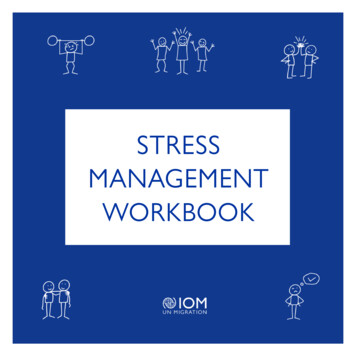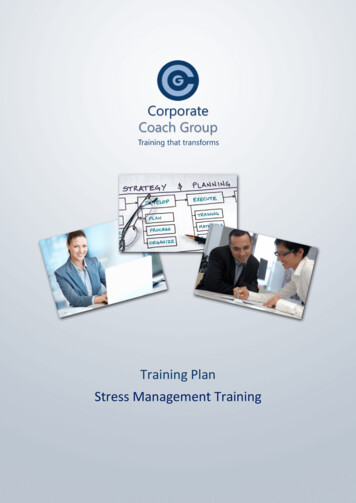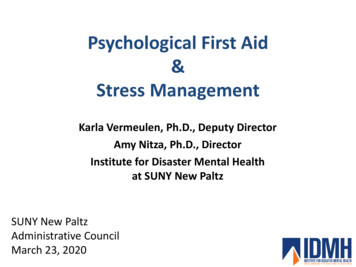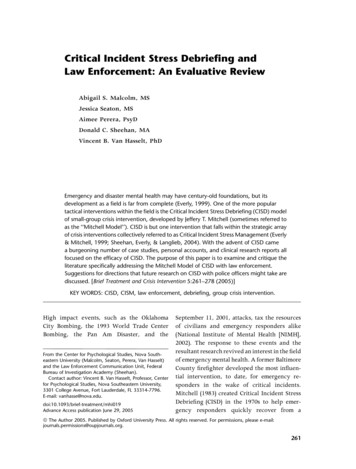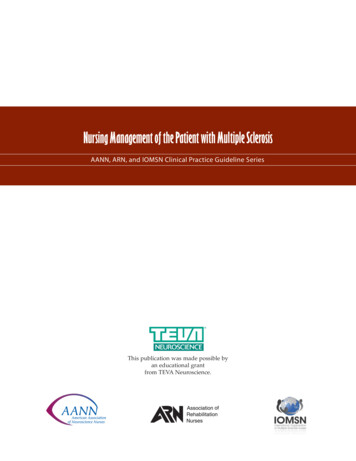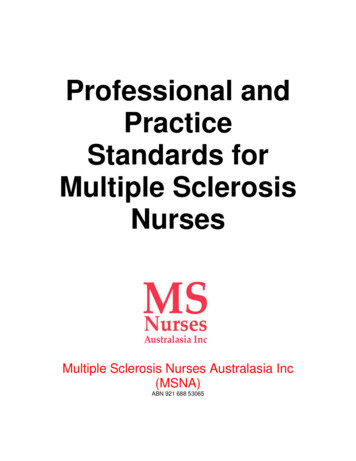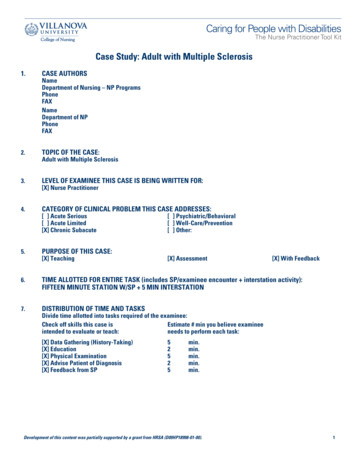
Transcription
Taming Stress inMultiple SclerosisSCOTTDIAGNOSED IN 2003
Taming Stressin Multiple SclerosisBY FR EDER ICK FOLEY, PHDW ITH JA NE SA R NOFFFrederick Foley, PhD, is director of psychological services at theMultiple Sclerosis Comprehensive Care Center at Holy NameHospital in Teaneck, New Jersey. Jane Sarnoff is a professionalhealth writer.This publication is supported by contributions to the NationalMS Society from its members and friends.Reviewed by: James Bowen, MD; Pat Bednarik, MS, CCC-SLP,MSCS; and Sue Kushner, MS, PT. 2016 National MS Society. All rights reserved.
Causes of stressBrought to you by evolution.When our ancestors were taking a morning stroll and met atiger, they could run or fight. Either action demanded thattheir bodies adjust rapidly to meet the emergency, and theyexperienced stress as part of the process.Without stress, we would not be able to act in times ofdanger. In fact, without some stress to get us to focus ona problem we might do almost nothing. Many peopleperform best while under stress. Other times, however,people are immobilized by the pressure that stress createsand prevents people from doing what needs to be done.Today’s tigersStress can be caused by both pleasant and unpleasantdemands and changes. In other words, people can be justas stressed by getting a promotion as by not getting one.Stress usually begins with alarm, the modern equivalent ofnoticing a tiger. However, our options are rarely as simple asrunning away or fighting. For example, most people are verystressed at the prospect of having to use a cane or wheelchair.Many eventually experience relief or accept the benefits ofthe aid once the stressor — the idea of using a cane or otherassistive device — has been sufficiently worked through.1 Taming Stress in Multiple Sclerosis
Stress and MSHaving any chronic illness increases stress. MS is no exception.In fact, stressful situations that are common with MS include:ndiagnostic uncertainties (before the definite MS diagnosis)nthe unpredictability of MSnthe invisibility of some symptoms (which can cause peoplewith MS to feel misunderstood by others)nthe visibility of some symptoms, particularly newlyemerging ones (to which others may react before theperson has had time to adjust). The biggest changeshere are the physical challenges presented by MS.nthe need to adjust and readjust to changing abilitiesnfinancial stress and concerns about employmentnthe presence — or possibility — of cognitive impairmentnloss of control (e.g., coming and going of unpredictablesymptoms)nthe need to make decisions about disease-modifyingtreatment and adjusting to the treatment if it is chosen.Does stress increase the risk of attacksor affect the long-term course of MS?Many people with MS feel that there is a definite connectionbetween stress and MS. Some believe that controlling stresscan have a beneficial impact on MS. and still others believethat neither stress nor controlling stress has any effect on MS.Scientifically speaking, the jury is still out.National MS Society 2
A relationship between stress and the onset of MS or MSrelapses is considered possible, but hasn’t been powerfullydemonstrated in studies. Can a stressful event cause nervedamage or lesions? Can effective stress management preventdamage? Can nerve damage or lesions increase someone’sexperience of stress? More research is needed to answerthese questions.Can stress make MS symptoms feel worse?Many people with MS say “yes.” They experiencemore symptoms during stressful times. When thestress abates, their symptoms seem less troublingor less severe. This could be understood by lookingat the stress and coping process.During times of stress, more energy is required to think,problem-solve, and handle daily life. For example, one’sability to be patient with family members often wanes aftera tough day. At stressful or demanding times, symptomsmay be experienced more strongly because the energy todeal with them and get on with life has been drained.Stress may add to the feeling of overwhelming fatigue, whichis already one of the most burdensome symptoms of MS.We all have finite limits on our ability to cope. Atdemanding times, our supply may temporarily rundry. Any difficulty, including MS symptoms, is morechallenging at these moments.3 Taming Stress in Multiple Sclerosis
Stress can’t be — and shouldn’t be — totally avoided.The challenge is to learn to reduce its intensity and useit to work for, not against, us.Recognizing stressCommon signs of stress include changes in breathing,tight muscles, cold sweaty hands and clenched teeth.But different people show their stress in different ways.In people with MS, some of the common signs of stress— fatigue and muscle tightness, for example — may alsobe symptoms of the disease. Understanding your stressresponses and learning to separate them from your MSsymptoms may help you recognize when you are stressed.Knowing what causes or increases your stress can be the firststep in taming it. What daily events or concerns stress youmost? You may find it helpful to make a list of the thingsthat have caused you the most stress in the last two weeks.You may want to ask those nearest to you to help yourecognize your stressors. But don’t be overly influencedby what others think should stress you — just take noteof what they think has caused you stress. A situation isn’tstressful unless you react to it with stress. Be careful not toblame every stressor, or your reaction to it, on the MS.National MS Society 4
Taming stress in your mindStress often evolves from the way we interpret situations— and the way we relate to the world around us. So muchin life could lead to stress: lost buttons, long lines, irritatingpeople, unreasonable requests, insurance forms, demandsat work; responsibilities at home. Some of these patternsmay have developed over a lifetime; therefore, it may takea while to make changes.Take a look at your stress producers. In what ways canyou re-interpret situations so that they don’t cause you somuch stress? How can you relate differently to people toavoid stress?If personal thinking patterns create or increase stress, newthinking patterns can be learned. Here are some examplesof thinking that increases stress:nYou think: “total failure” whenever you’re short of absoluteperfection. (Alternative: “I did a pretty good job — I’ll do itbetter next time.”)nYou think: you are responsible for everything: “I wonderwhat I did to make him feel like that?” (Alternative: “I amnot the center of everyone’s world.”)nYou think: “should” about everything: “I should be treatedfairly.” (Alternative: “I’d like to be treated fairly, but.”)nYou think: “I probably won’t be able to do that.no use trying.”(Alternative: “I think I’ll give it a try and see how far I can go.”)nYou think: one thing is everything: “I messed that up, I’llmess up everything.” (Alternative: “I am not very good atthat, but I’m good at many other things.”)5 Taming Stress in Multiple Sclerosis
Common signs of stressEmotional signsnChronic irritability or resentmentnFeeling down in the dumps, demoralizednContinual boredomnExcessive nervousness or anxietynFeeling overwhelmednNightmaresThinking-related signsnWorrying every daynDistractibilitynExpecting the worst to happennDifficulty making everyday decisionsPhysical signsnnClammy handsor sweatingnConstipation/diarrheaMuscle spasmsor tightnessnLump in throatnDry mouthnFaintnessnHeadachesnFatigue/wearinessnHeart palpitationsnnStomachaches, knots,cramps or nauseaSleeping too much/too littlenShort and shallowbreathingNational MS Society 6
Can you cut stress down to size?Some very ordinary events — combined with negativethinking habits — can produce major stress. Otherevents are stressful to even the most optimistic or resilientpeople. When you examine your stress producers, reviewthe pressures that may have been part of your life for solong you may not immediately identify them as stressors.Examples include a declining relationship with yourpartner, declining job performance, an ongoing effortto hide your symptoms, or financial problems such asbattles with insurance companies or entitlement programs.Reviewing the pressures may help start the process ofidentifying resources. You may want to consider a marriagecounselor, job coach, financial planner, patient advocateor asking for accommodations at work. Regardless of thestressor, stress is never trivial.Talk your way out of stressSharing your thoughts and feelings can relieve stress.Building a support network of people who know aboutyour illness and the difficulties you face is one way togain a wider range of opinions.Talking with others can sometimes help you see the thingsthat cause you stress in a new light. There are more than 1,200self-help groups affiliated with the National MS Society.7 Taming Stress in Multiple Sclerosis
Call 1-800-344-4867 for a list of groups that are near youor visit nationalMSsociety.org/supportgroup. Theremay be one that’s right for you. Joining the MS onlinecommunity (MSconnection.org) is another way toconnect with others to share feelings and opinions.Talking with friends and family often means educatingthem so that they will better understand your experience.Some people can do this on their own; other people preferthe help of a counselor or other mental health professionalto help them communicate with the important people intheir lives. The MS Society can give you referrals.Expressing angerLetting your anger out can relieve stress — and it is mosteffective when done without blaming others. You mightsay “I’m so angry” instead of “you make me so angry.”After expressing your anger, you may want to do a fewcycles of deep breathing to help you regain your calm.When calm, make a plan to face the underlying situationthat made you so angry. Expressing anger may relievestress, but it doesn’t change the situation.Managing expectationEvery time we meet someone new or start a new job, wehave to find out where we can assert ourselves and wherewe need to make changes or compromises. People with MSNational MS Society 8
often negotiate and renegotiate as symptoms come and go,particularly if their abilities have been altered. In tellingothers how you feel, always mention that MS is changeableand that flexibility in expectations (yours and theirs) is key.Leave the door open.This is more than just stress!Depression is one of the most common symptoms ofMS. Major depressive disorder affects approximately14.8 million American adults, or about 6.7 percent ofthe population age 18 and older, in a given year. Morethan half of people with MS will experience a majordepression at some point in the course of their disease.In MS, depression has been shown to be associated withchanges in the brain and in the immune system, as wellas to the physical and emotional challenges posed by theillness. Although depression is a serious illness, it canbe treated effectively. Diagnosis and treatment require amental health professional who is experienced with MSand/or willing to work with your MS healthcare team.Special problems with stress,depression and MSSome of the symptoms of stress are remarkably similarto symptoms of depression and some mimic or overlapsymptoms of MS.9 Taming Stress in Multiple Sclerosis
Depression causes people to lose interest in their usualactivities. In addition, they often experience five or moreof the symptoms listed below to some degree. (Noticethat symptoms such as fatigue or inability to concentratecan also be symptoms of MS.)Signs of depressionnFeeling “blue” or “down in the dumps” most of theday, nearly every daynLoss of interest in doing things that normally wouldinterest you or difficulty feeling pleasure when thingshappen that would normally be pleasurablenSleeping too much or too littlenMarked changes in appetite, or weight gain or lossnAgitation and anxiety or a slowing down of mentaland physical activitynDecreased energy and increased fatiguenFeelings of worthlessness, guilt and self-reproachnIndecisiveness, memory loss, difficulty concentratingnThoughts of death or suicide or of harming yourselfor othersIf you, or those close to you, think that you have becomedepressed or if you have had five or more of these symptomscontinue for more than two weeks, talk to your physician orto a mental health professional.National MS Society 10
Each of the interferon medications used to treatmultiple sclerosis carries a warning that themedication should be used with caution by personswho have a history of depression. If you are takingan interferon medication for your MS, have ahistory of depression or experience significantchanges in mood, please talk with your physician.Cognition and stressMS-related cognitive changes are known to occur in morethan half of people who are living with MS. As withall other symptoms of MS, the type and the extent ofcognitive problems differ widely from person to person.While most people will experience mild to moderatechanges in their cognitive abilities, about 10 percentof those affected will have much more severe cognitivedifficulties. The most common problems are in the areasof speed of thinking or information processing, learningand remembering new information, and the ability tofocus and sustain attention. Changes in planning andproblem-solving abilities are also relatively common.These cognitive changes are a consequence of MSlesions in the brain — not caused by stress, depression,medication or fatigue. But all of these factors can alsoaffect thinking and worsen cognitive symptoms. In timesof great stress it is common for anyone to forget things,11 Taming Stress in Multiple Sclerosis
or have difficulty concentrating or making decisions —changes that can be confusing and worrisome to a personwith MS. These sorts of stress-related lapses are temporaryand improve when the stressful time passes. If you noticecognitive symptoms, no matter what you think mightbe the cause, it is important to talk with your physicianabout what you are experiencing. Having problems withcognition can cause or exacerbate stress. The loss of anyability is stressful — and so is the fear of that loss.The National MS Society’s Managing CognitiveProblems, by Dr. Nicholas LaRocca, explains cognitiveproblems in detail — and what can be done about them.People with MS-related cognitive changes may find ithelpful to develop or concentrate on these strategies toreduce stress due to cognitive problems. For example:nKeep a daily diary or a notebook for lists to reduce the stressof trying to recall a day’s activities. This can be done on thefly using a smartphone or tablet.nAsk for written information and instructions to reduce theneed for remembering details.nShare concerns and responsibilities with others to lightenyour load practically and emotionally.nDiscuss cognitive rehabilitation techniques — designed toimprove performance — with your MS healthcare team.nPractice some form of stress management on a daily basis.nContact the National MS Society for informationand assistance.National MS Society 12
Techniques & strategiesfor taming stressEveryday strategiesTo help get everyday stress under control:nSimplify your life. Relax a few standards. Let the grass grow.Ask yourself if you want to do a particular task, if it needs tobe done perfectly, or not at all.nPlan ahead in situations that could cause stress. Take a bookwith you if waiting may be necessary. Make plans for whereto meet or call if plans go awry.nGet extra sleep before family gatherings or important events.nLearn to say no. You don’t have to do anything if you don’thave the time, energy or desire.nMake your requests for help as specific as possible: “Wouldyou please help me by.”nIf old interests and activities become more difficult or tootime consuming, replace them with new ones that fit yourcurrent needs.nGet very practical: Make an extra set of keys. Update your telephone/address directory. Keep the car and other important appliances in goodworking order. If small things you need don’t work, get new ones:shoelaces, alarm clock, can opener.13 Taming Stress in Multiple Sclerosis
Keep a good supply of small items you use all the time:toilet paper, batteries, stamps, change for the bus. Investigate and use gadgets, aids and devices that savetime or effort.nDo the unpleasant things early in the day so that you don’thave to worry about them.nCarry a notebook, smartphone, or tablet to write yourself —and others — notes for the day, the week, the month.nIf you find that you are breathing in a short, shallowpattern, it’s time to take a break. That kind of breathingoften accompanies stress. To break the pattern, sit downfor a minute. Take deep, slow breaths and relax all yourmuscles (see page 17).nDon’t try to answer the phone on the first ring. Let it ring.Consider buying an answering machine.nMake a 3/4 rule: fill the gas tank when it is 3/4 empty; ordermore medication when it is 3/4 gone; replace juice when thequart is 3/4 gone.nWhen you find a task difficult or stress producing, try tofind a better way of doing it. If you can’t think of an easierway, ask a friend to help you look at the problem. Onceyou have found a solution, you might want to make a noteof it to remind yourself of good choices you have madethat might be adapted for other problems.nIf the morning rush is stressful: Get up 15 minutes earlier. Ask someone else to take on a morning task. Do some of the preparation the night before. Make sure that all your morning tasks are absolutelynecessary.National MS Society 14
nMake equal exchanges in your life. Do you find it toostressful to travel to see your family and friends? Giveyourself permission to use the same money to makeregular phone visits.nUse your imagination to get yourself used to an eventyou are not looking forward to. You need to visit anew doctor? Imagine what you are going to wear, whatquestions you want to ask, what questions will be askedof you. Think about the visit the way you would likeit to be.Then imagine the worst thing that could happenand how you would deal with it.nRemind yourself that you are a person — not a “multiplesclerosis patient.”nDrive 10 miles an hour slower. And try a new route fromtime to time. If long car rides cause you stress, listen toaudiotapes of books or pleasant music.nSchedule rest periods. (You may want to set an alarm totell you that it’s time to rest.) Knowing that you are goingto rest on a regular basis can stop you from feeling guiltyabout doing it.nTry to do something you enjoy each day.nSit quietly for a minute or two before starting your meal.Say grace if you wish, or just notice — really notice —where you are, what you are eating, who you are with.nTake a shower at the end of the day. Let water carry caresdown the drain.nSpend as much time as possible with people whoaren’t worriers.15 Taming Stress in Multiple Sclerosis
nLearn to revise time schedules. If you told a friend youwould meet at noon, and you are running late, is thereany reason the appointment can’t be changed to 1:00?nDo one thing at a time. Don’t think about the next taskbefore you have finished the one you are working on. Letyourself feel a sense of accomplishment before moving on.nBoredom can be stressful: take a course, join a club, learna new skill.nEat regular, balanced meals. Keep prepared foods in thehouse for times when you don’t feel like cooking or shopping.nReduce reliance on cigarettes, caffeine, and alcohol. Askyour doctor for help if necessary.nWork toward the “Best Sense of Humor” award; don’t try for“Gets the Most Done.”nAsk for help when you need it.nUse support and education services. Let the experiences ofothers help you solve problems — and your experiences tohelp others.RelaxationOne of the most unhelpful questions you might be askedis “why don’t you just relax?” Relaxation isn’t somethingyou just decide to do. People have to learn to relax. Youcan discover what works for you, and then practice.There is no one right way to relax. Some people findthat reading, listening to music, meditation, or prayerin a quiet room relaxes them. Others garden, paint,cook, or do puzzles.National MS Society 16
Many people use one or more of the relaxationtechniques described in the next nine sections. Readthrough the descriptions and consider which mightbe best for you. Give one a try for a month or so. Ifit doesn’t work, try another. And try again. Differentmethods of managing stress through relaxation maywork better at different times.To make relaxation easier, give yourself permission to taketime for yourself. Don’t feel guilty about shutting a doorand telling everyone to give you some alone time.Deep breathingDeep breathing can help reduce tension and allow yourmind and body to feel more comfortable. The exercisetakes only a few minutes and can be done almost anywhereat any time. Try deep breathing to start the day andthen repeat it several times throughout the day. Deepbreathing can also help you relax just before an eventthat might be stressful.You may want to make a tape of the following instructionsto play while you are learning the exercise:1. Sit with your back straight and your shoulderscomfortably back.2. Put your hand on your belly, below the waist, so that youcan feel your breathing.17 Taming Stress in Multiple Sclerosis
3. Inhale through your nose slowly and deeply. The air willfeel cool. Concentrate on the feeling of the air as it movesinto all parts of your body.4. As the air reaches your belly, let your belly expand. Somepeople tend to tighten their bellies as they breathe in.Your hands on your belly will let you feel the movement.5. Draw in as much air as you can. Then, hold your breath for afew seconds — four or five is fine. You don’t need to distractyourself by counting unless it makes you more comfortable.6. Begin to exhale. Shape your lips as if you were going towhistle and slowly breathe out between your lips. Useyour lips to control how fast you exhale.7. Concentrate on the feeling of the air leaving all parts ofyour body. The air coming out should feel warm.8. Your hands will let you feel the breath leave your body. Yourbelly will deflate and as it does, the large muscle under yourribs — the diaphragm — will get larger.9. When you feel your lungs empty, sit quietly for a momentand then repeat the inhale/exhale cycle. Repeat the cyclefour or five times.10. Sit quietly for a minute or two.Clear your mindThe “clear your mind” exercise is an enjoyable relaxationexercise for many. However, it takes practice to do it well,and may seem deceptively easy. This exercise may be frustratingor require more practice if there are difficulties with attentionand concentration.National MS Society 18
1. Choose a time when you have about 10 minutes availablein a place that is relatively free of noise and distractionand where you will not be interrupted.2. Loosen tight clothing, remove your shoes, and sit in aposition that is comfortable.3. Close your eyes and do two inhale/exhale cyclesof deep breathing.4. With your eyes still closed, picture in your mind a pleasant,restful place. Try to visualize as many details as possible:what objects are present, the color of the sky, who ispresent, etc. Concentrate on that place. Watch the windblow on the trees or the water. Notice how the leaves turnslowly. Imagine your other senses experiencing the scene.Feel the gentle cool breeze on your skin. Breathe deeply andslowly, and imagine the smells associated with your scene,perhaps the fresh salty air of the ocean, or the clean woodsysmell of the country. Imagine hearing the sounds associatedwith your scene, perhaps the sound of the breeze movingsoftly through the trees or the call of birds.5. Some people have difficulty visualizing or creating a “picture”in their mind’s eye. If this is the case, you may find this exerciseis not for you. An alternative approach is to follow steps1 through 3 above. Instead of visualizing a relaxing scene instep 4, concentrate on a word — “calm” — or a thought —“I am loved.”6. Don’t worry if other thoughts or images break in — it isn’teasy to clear your mind. When you notice your mind hasdrifted, gently return your thoughts to your image or word.If you have trouble, do another cycle of deep breathing and19 Taming Stress in Multiple Sclerosis
try again. It may take considerable practice to learn to clearyour mind. As you do so, the relaxation will become deeperand you will feel refreshed and more energetic.7. End the mind clearing by stretching — to reawaken yourbody to the world around you — and exhaling.MeditationYou may want to continue on to deeper meditation onceyou have learned to clear your mind. Many people findthat meditation greatly decreases the stress in their lives.It takes about 15 minutes once or twice a day. Try tomeditate at the same times each day.1. Sit as you would for mind clearing in a quiet place, freefrom distractions. Unplug the phone and close the door.Tell everyone you are going to be busy for 15 minutes.2. Do two or three cycles of deep breathing.3. Pick a word or phrase that makes you feel calm. Althoughany word will do, many people find that words that end inan m or n sound are most helpful — words like “calm,”“home,” “noon,” or “one.”4. Close your eyes and repeat the word or phrase over andover either in your mind or out loud. Concentrate on theway the word sounds inside your head. Try not to thinkabout what you are doing or how you are feeling.5. If you have trouble relaxing or concentrating on the word,stop, do a cycle of deep breathing, and try again.6. End the exercise by gently stretching and exhaling.National MS Society 20
7. Although 15 minutes may be the ultimate goal of themeditation period, the actual time isn’t reallyimportant. Be realistic. Don’t worry if you only are ableto concentrate for a few minutes at first. Just sit quietlyfor the rest of the time period. (Just sitting quietly willdo you good.) With practice, the time and the depth ofrelaxation will increase.VisualizationVisualization is a combination of meditation, clearingyour mind, imagination, and deep breathing. Withvisualization you do more than just see an appealingscene. You move yourself — in your mind — into thepicture. You watch yourself reaching your hand out topick a flower or to trail your fingers through a sunlitstream. You go to the beach and let the sand sift throughyour hand onto your leg.Start the exercise by doing three or four cycles of deepbreathing, and end the exercise by stretching and exhaling.If you can’t enter the picture at first, do a cycle or two ofdeep breathing and try again. As with the “Clear YourMind” exercise, try to experience the scene with as manyof your senses as possible. Hear the sound the rushingstream makes, and how the sound changes as you changethe position of your hand. Smell the cool fresh scent ofthe stream, and feel the water on your fingers. The entireexercise can take as few as 5 and as long as 15 minutes.21 Taming Stress in Multiple Sclerosis
Progressive muscle relaxationProgressive muscle relaxation is often used as an aid tostress management. And, done in bed before you go tosleep, it can be an aid to a sound night’s sleep.Going through your body’s entire group of muscles— tensing, relaxing and focusing on the changes —will take about 12 to 15 minutes. If it takes less timethan that, you are moving at a non-relaxing speed.These exercises will provide the most benefit if youdo them twice a day. If there are some muscle groupsthat you cannot work with comfortably, skip them.If you have significant spasticity in some muscles, stronglytensing those muscle groups could trigger a spasm. Youmay want to speak with a physical therapist or other MShealthcare professional about ways to work in a morecomfortable way.Many people, especially those with cognitive problems,find that the exercises are easier to do along with aprerecorded tape. You can prepare the tape yourself or asksomeone with a relaxing voice to do it for you.You will work with each of 17 muscle groups in a specificorder. Tense, but don’t strain each muscle group. Holdthe tense position for the slow count of five, payingattention to the way those muscles feel. Relax the muscles— letting them go totally limp. Focus for a count of fiveon how the muscles feel when relaxed.National MS Society 22
To prepare for the exercise, wear comfortable, loose-fittingclothing, remove glasses or contact lenses, and sit up in achair without crossing your legs or arms. You may also dothis lying down in bed.1. Clench both hands. Focus on how your hands feel and howthe tension moves into the forearms. Relax. Notice whatthe muscles in your hands and forearms feel like now.2. Touch your fingers to your shoulders. Raise your arms levelwith your shoulders. Focus on the tension in your bicepsand upper arms. Relax and focus on the change in feeling.3. Shrug your shoulders, raising them as high as possible.Focus on the tension in your shoulders. Relax and focuson the change.4. Wrinkle your forehead. Notice where tension occurs —around your eyes and forehead. Relax and focus on thechange.5. Close your eyes tightly. Focus on the tension. Relax andfocus on the change.6. Clench your teeth. Focus on the tension in your jaw and,mouth, and chin. Relax and focus on the change.7. Press as much of your tongue as possible onto the roofof your mouth. Focus on the tension in your mouth andthroat. Relax and focus on the change.8. Move your head slowly backwards as far as you comfortablycan, keeping your shoulders level. Focus on the tension inyour neck and upper back. Relax and focus on the change.23 Taming Stress in Multiple Sclerosis
9. Pull your head forward, down onto your chest. Focus onthe tension in your neck, shoulders, and upper back. Relaxand focus on the change. If you experienc
Stress can’t be — and shouldn’t be — totally avoided. The challenge is to learn to reduce its intensity and use it to work for, not against, us. Recognizing stress. Common signs of stress include changes in breathing, tight muscles, cold sweaty hands and clenched teeth. But different peo
